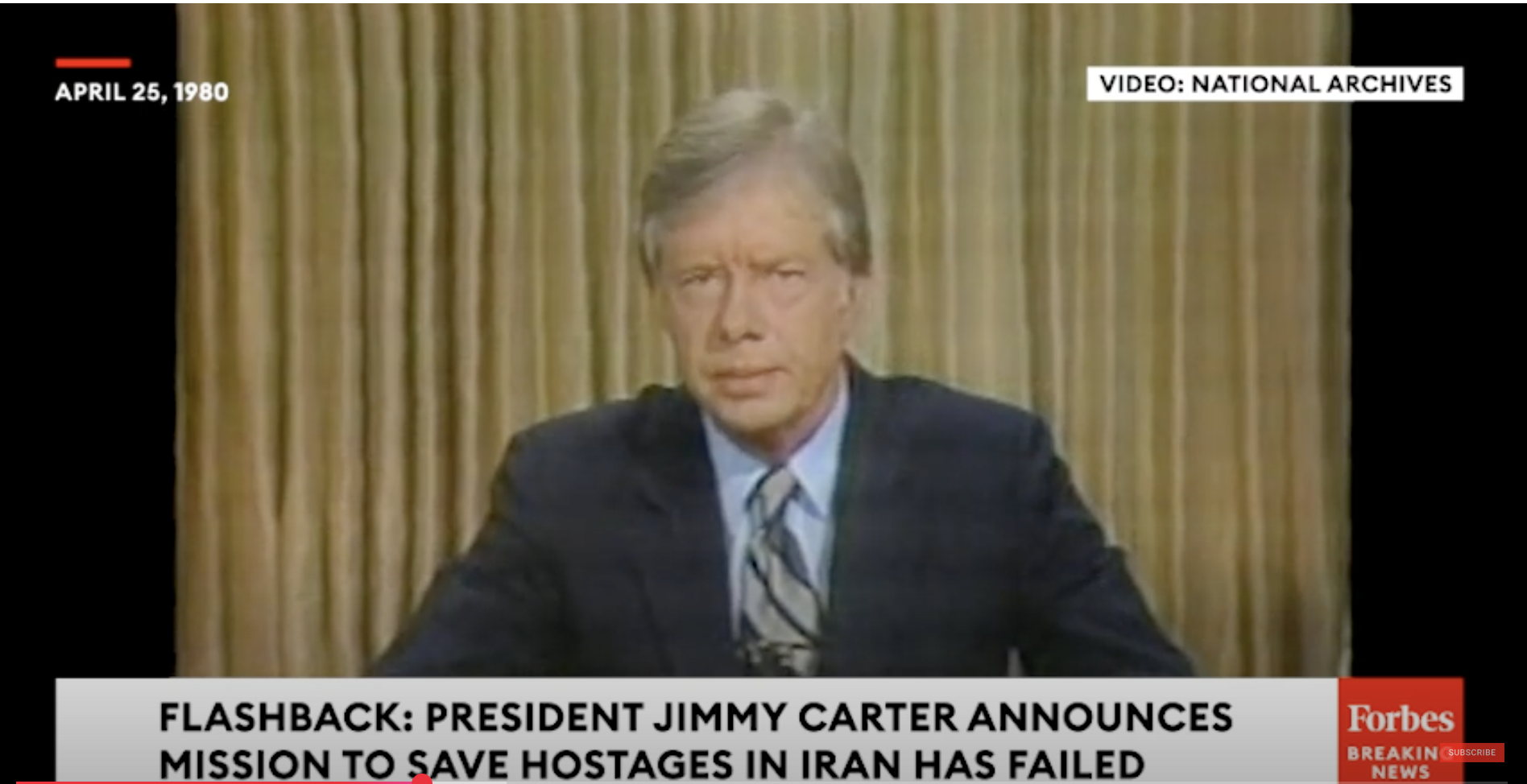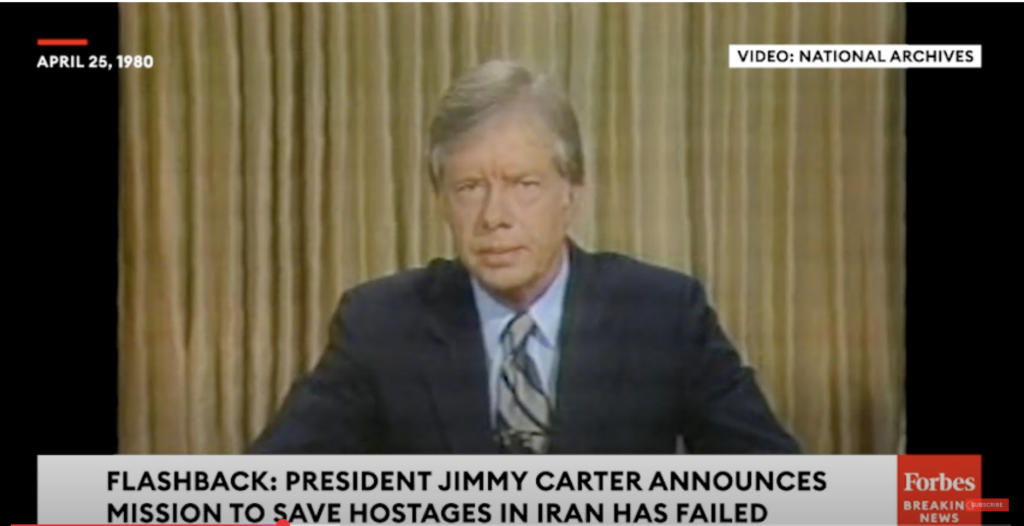Originally Authored at TheFederalist.com

Kevin Hermening was a 20-year-old sergeant with the Marine Security Guard protecting the U.S. Embassy in Tehran when all hell broke loose. On Nov. 4, 1979, Iranian students serving the Islamic Revolution stormed the compound and held more than 50 American citizens — including Hermening — hostage.
“We had 12-gauge shotguns and .38 caliber revolvers, and that was it,” Hermening told me this week during an interview on the “Vicki McKenna Show.” “We were way outnumbered.” The U.S. acting ambassador and the attaches gave the orders to the Marine security forces to lay down their weapons, the Wausau, Wisconsin, financial services professional said.
“There was nothing that was going to be done to shoot our way out of it,” Hermening recalled of the chaotic day, now 45 years in the world’s rearview mirror but still so present in U.S. foreign affairs.
The Marine and 51 others would spend the next 444 days as hostages of an unholy war that made the world’s greatest superpower look like a chump on the world stage (The revolutionaries released 13 hostages in the opening weeks of the Iran Hostage Crisis, including all of the women taken as well as the black captives — billed as “oppressed minorities” by the Iranian oppressors).
As fond to fawning remembrances of James Earl Carter flow from the pages of the corporate press following Sunday’s passing of the 39th president, many of the glowing obituaries are leaving out or glossing over some critical details. While Jimmy Carter in many ways may have been a good man, he was an absolutely lousy president.
Hermening, 444 days a hostage, has a decidedly different take on the former president than the sanguine scribes in the accomplice media. He remembers an incompetent commander-in-chief, the leader of the free world who led with his heart instead of his head. And the world, Hermening said, has suffered much because of it ever since.
‘A Gun to Their Heads’
It was cool and drizzly on the day the embassy fell, Hermening told Disabled American Veterans in a post published on Nov. 1, 2023. He said he had been at the embassy working on plans for the upcoming Marine Corps birthday ball.
A riot was brewing outside.
“Looking out onto the front grounds, I saw hundreds of Iranians already gathering and thousands more smashing through and eventually opening the front gate,” he told DAV.org.
The hostages were routinely terrorized by the Islamic revolutionaries. Iranian jihadists had months before ousted the West-backed Shah Mohammad Reza Pahlavi, the Shah of Iran, who had fled in January that year. The leadership gap was filled by the Ayatollah Ruhollah Khomeini, the exiled Shi’a religious leader who had returned from Paris to lead the terror-steeped Islamist revolution fueled by deep-seated hatred for the United States — and the West in general.
The American Embassy hostages were often awakened in the night with a gun to their heads. Their captors would pull the trigger of the unloaded weapons in mock executions, the DAV.org post recalled.
“Army Col. Charles Scott, chief of the Defense Liaison Office at the embassy, was beaten severely during an interrogation, and three of his teeth were broken off at the gum line — injuries that went untreated until after they were released,” the publication noted.
‘Warned for Months’
Over the past 45 years, Hermening has often pondered the failures of the Carter administration and the weak president behind the foreign policy disaster.
“The problem is that back in Washington, D.C., the reports being given to the president of the United States were severely flawed, because the State Department officials in Tehran were giving the information of how unstable it was,” Hermening told me in the radio interview.
The White House disregarded the intelligence from the ground. Carter allowed the Shah of Iran to receive medical care in the United States despite now-declassified documents out of Tehran warning that the embassy would be seized and the Americans inside would be taken captive if the Carter administration allowed the Shah refuge in the United States.
“Iran experts inside the State Department had warned for months that to do so would create huge problems for U.S. policy and even endanger diplomats in Iran but Carter’s senior advisers one-by-one lined up in favor of admitting the Shah,” a retrospective on the hostage crisis from the National Security Archive at George Washington University states. The shah, after all, was an old pal and a very well-paid ally in the Cold War against communism.
More incredulously, Hermening said, was that the “delusional Department of State” about a week before the seizure of the embassy was authorizing family members of diplomats and senior military officers to come to Tehran.
‘Wrong-Headed Approach’
As the weeks dragged into months, Carter’s Pentagon planned a rescue mission. The botched operation, launched on April 24, 1980, ended with the deaths of eight U.S. service members and not a single hostage rescued. It arguably was one of the more impotent moments in U.S. military history, undertaken by a notoriously weak administration.
Hermening and his fellow hostages would be held by their terrorist captors for another nine months. They were finally released on Jan. 20, 1981, the day Carter’s successor, Ronald Reagan, was sworn into office.
“As he and Reagan sat uncomfortably with one another in a limousine on the way to Reagan’s inauguration, Carter got a call from National Security Agency Director Bobby Ray Inman telling him that the hostages would not be allowed to leave Iran until after Reagan was sworn in,” presidential historian Tevi Troy recently wrote in a column for City Journal. “The Iranians would not give Carter even the small victory of seeing the hostages released on his watch.”
Some insist the hostages are alive because Carter placed their lives above America’s image in a Cold War world. Hermening said that’s conjecture at best. One thing he said he’s sure of all these years later is that the Democrat’s weakness has cost the United States dearly.
“…[Y]es, of course, I’m glad I’m here. I’m glad I’m alive. I’m glad we returned home, save the eight heroes who perished [in Operation Eagle Claw] during the aborted rescue mission in April of 1980,” the former hostage said. “But President Carter put the interests of 50 people ahead of the interests of the entire country, and that is the wrong-headed approach.”
“I understand the humanitarian side of that, but it’s not great leadership because we have been seen as a paper tiger by the most radicalized elements of the Middle East and their followers across the globe now for 45 years. And it started with President Jimmy Carter’s failed leadership in Washington,” Hermening continued.
A Legacy of Foreign Policy Fecklessness
As Troy noted in his remembrance of Carter, one of the 39th president’s primary weaknesses was that “he had a hard time distinguishing between friends and enemies.”
“Perhaps this fault explains why, after he left the White House, Carter gained a reputation as an ex-president for coddling dictators, whether in Haiti, Syria, or North Korea,” the historian wrote.
The Iran hostage crisis emboldened despots around the world, particularly the communists. Soviet Union-backed Marxists seized power in Africa and Asia as the U.S. weakly watched. Reagan would ultimately win the Cold War and bring back respect for the lone-standing world power through strength, but the worldview damage from the Carter years lives on.
The Algiers Accords, brokered with and without the Carter administration, freed the hostages, but they also pushed the U.S. to stay out of Iran’s business — even when Iran has rattled its sabers at what it has vilified as “the Great Satan.” And the U.S. signed off on a special tribunal to resolve disputes over frozen Iranian assets. One of the big payouts arrived in the final year of the second term of President Barack Obama, whose naive foreign policy was often drawn from the book of Carter. Remember the pallets of cash, including the $400 million ransom for the release of American prisoners, Obama’s team secretly airlifted to Tehran?
The Wall Street Journal reported in August 2016:
Revolutionary Guard commanders boasted at the time that the Americans had succumbed to Iranian pressure. “Taking this much money back was in return for the release of the American spies,” said Gen. Mohammad Reza Naghdi, commander of the Guard’s Basij militia, on state media.
Biden’s Hero
Hermening said he finds it interesting that Carter, who died Sunday at 100, lived long enough to see his legacy as the “worst president our country ever had” eclipsed by the presidency of the soon-to-be departing President Joe Biden. The 46th president’s Iran Hostage Crisis moment came in the first year of his presidency amid the catastrophic U.S. withdrawal from Afghanistan, in which 13 U.S. service members were murdered in a terrorist attack. The House Foreign Affairs Committee Republicans’ report, “Willful Blindness: An Assessment of the Biden-Harris Administration’s Withdrawal from Afghanistan and the Chaos that Followed,” found, among other failures, that “the Biden-Harris administration prioritized the optics of the withdrawal over the security of U.S. personnel on the ground.”
As one of his last acts of a dismal presidency, Biden has called for a national day of mourning for his hero, Jimmy Carter. The federal government will be closed on Thursday, Jan. 9, the same day as Carter’s funeral. As the Milwaukee Journal Sentinel noted this week in a Carter-Wisconsin connection piece, Biden, a young senator in 1976, was the “first elected official outside Georgia to endorse Carter for the presidency that year.”
“I think Carter is the guy who can win,” Biden said at a campaign stop in Madison, according to the publication. He described the Georgia peanut farmer as “a good old boy who understands what’s happening in the industrial states.”
In his message to Congress on the death of the 39th president, Biden mused that Carter’s “commitment to a more just world was at the heart of his foreign policy,” He of course mentioned nothing of the debacle in Iran, the hostages, or America’s badly damaged image because of Carter’s foreign policy weakness.
Hermening, one of the hostages Biden failed to note, said Carter and some of his successors never understood the fundamentals of good foreign policy, that “you don’t have to use your power, you just have to let people know you’re willing to use it.”
“And they knew that President Carter was not really willing to use it, much like we’ve seen happen quite often over the last 40 years,” the retired Marine sergeant told me.
Matt Kittle is a senior elections correspondent for The Federalist. An award-winning investigative reporter and 30-year veteran of print, broadcast, and online journalism, Kittle previously served as the executive director of Empower Wisconsin.
